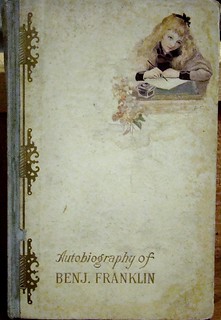Narratives can take a number of forms, and I’m not talking about end products (that’s a topic for another series). Over the next few weeks, we’ll talk about some different types of narratives and how they can contribute to your family’s story.
A brief note before we start: It is important to understand that, while we are writing stories about our family, we should be careful to ensure that our narratives are non-fiction. This means that the basic facts of our ancestors’ lives are presented as they happened and not as we wished they would have happened. The narrative process allows for the addition of color, but we must be clear about where we have speculated about an occurrence. Too many family histories passed down through the years have been twisted (usually innocently) by passing wishful thinking or inaccurate hearsay as fact. Tell an interesting, engaging story, but tell it truthfully!
 Autobiography is the story of a person’s life as told by that person. The author (sometimes with the assistance of a ghostwriter) is the subject of the narrative. The scope is typically broad, encompassing the majority of the subject’s life.
Autobiography is the story of a person’s life as told by that person. The author (sometimes with the assistance of a ghostwriter) is the subject of the narrative. The scope is typically broad, encompassing the majority of the subject’s life. The major advantage of autobiography is that the author has good knowledge of the subject matter - no one is more of an expert on your life than you are!
The downsides include the temptation of biased reporting (making yourself read better on the page than in real life) and the very real potential for inaccuracies in remembering past events. Can you recall enough specific details about your grade school years to make a coherent story? Even when writing about yourself, don't shy away from doing research and citing sources for specific facts.
= = =
Memoir can be considered a form of autobiography, just on a smaller scale. Whereas autobiography tells the story of an entire life, memoirs focus on particular segments of the author-subject’s life: school years, military service, travels, etc.
Memoirs can also discuss the author’s memory and opinions of a larger event, such as the Pearl Harbor attacks or the first Moon landing. Depending on your generation, I'd bet that nearly every American can tell a memoir of where they were on 22 November 1963, 28 January 1986, or 11 September 2001.
As with autobiography, the benefits of the memoir style include the strength of personal knowledge and a greater acceptance of emotion and memory (“This is how I remember it”) in recalling a subject. Some people may also find crafting a memoir around a specific event or topic less daunting than writing the story of a whole lifetime.
Among the disadvantages of memoir as a narrative form is the same potential for bias as in autobiography. The heavy emphasis on personal opinion inherent to memoirs may also skew some facts of a story, especially with the lack of context of a larger life.
Our Friday Focus writing prompts at The Family Yarn tend toward the memoir style, but ideally supported by documented facts. Just because a story includes verified names, dates, and places doesn't mean that it has to forsake emotion, opinion, and flair.
Why don't you give this a shot? Write a brief memoir about a specific time period in your life - maybe that time your family moved to a new city or your feelings of the last day at a job. Save your story for inclusion in your own narrative; if you're comfortable, share it in the comments below.
= = =
Coming next week: using diaries and journals as the basis for a family narrative
Flickr.com Photo Credits
Autobiography of Benjamin Franklin (CC BY-ND 2.0) by one2c900d
Aftermath of World Trade Center Attack (CC BY 2.0) by NASA Goddard Space Flight Center
Autobiography of Benjamin Franklin (CC BY-ND 2.0) by one2c900d
Aftermath of World Trade Center Attack (CC BY 2.0) by NASA Goddard Space Flight Center

No comments:
Post a Comment